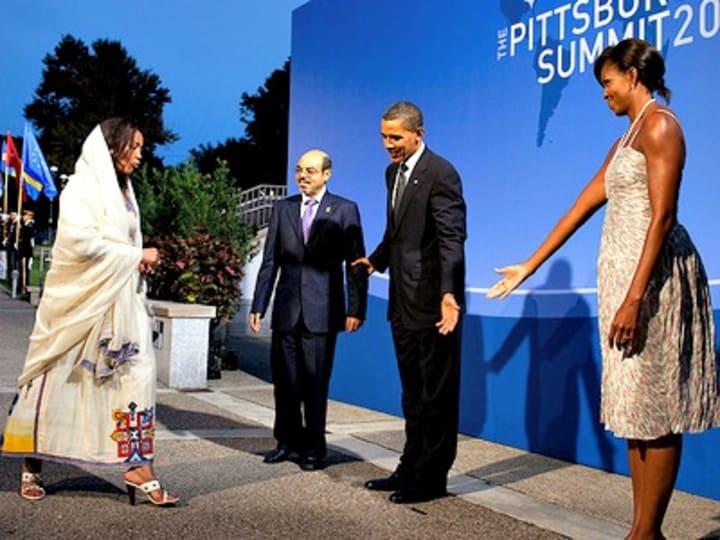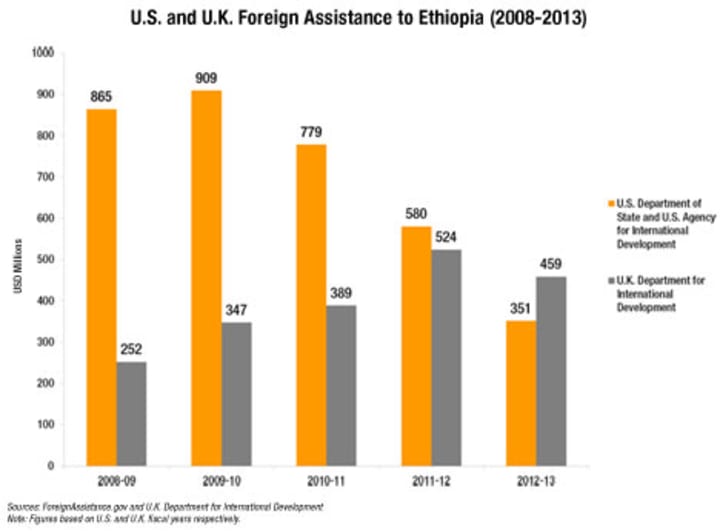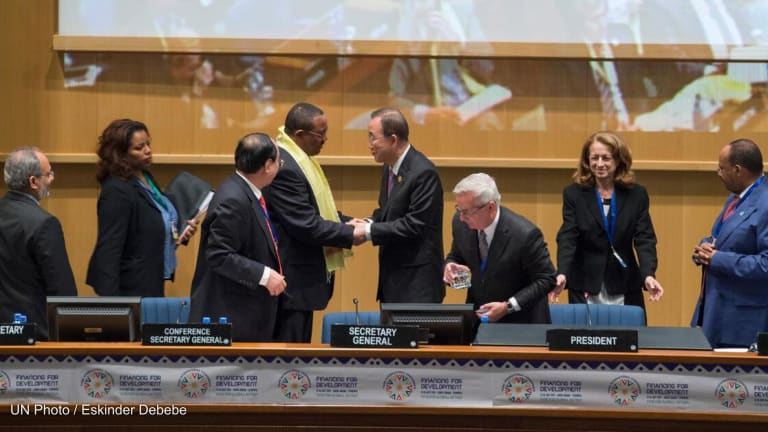
Last week marked the beginning of a new year in the Ethiopian calendar, but the usual commemorations were overshadowed by the recent death of Ethiopia’s longtime ruler, Meles Zenawi.
“The mood has been somber. Everyone was taken by surprise … Just two days ago, it was New Year’s and normally that is a big celebration,” David Murphy, the International Rescue Committee’s country director in Ethiopia, told Devex last week.
Zenawi died of a mysterious illness at a Brussels hospital on August 20. On Saturday, acting Prime Minister Hailemariam Desalegn was confirmed by the ruling party as Ethiopia’s new leader. He is expected to be sworn in as prime minister next month.
Zenawi, who led Ethiopia for over 21 years, leaves behind a mixed legacy. Since taking power in the aftermath of a protracted civil war in 1991, he helped usher in and uphold a period of relative political stability in Ethiopia – no small feat in the troubled Horn of Africa. Backed by foreign aid donors, state-led investments in agriculture, education, health, and infrastructure not only transformed Ethiopia into Africa’s fastest-growing non-oil economy, but also lifted millions out of poverty. While Ethiopia remains one of the poorest countries in the world, the UN Development Program says that the East African nation is well-positioned to achieve all eight of the Millennium Development Goals.
In 2010, Zenawi cruised to a fourth term as prime minister in an election that was marred by allegations of fraud and intimidation and drew flak from both the European Union and the United States. Indeed, many are quick to point out that despite Ethiopia’s development achievements, Zenawi’s democracy and human rights record leaves a lot to be desired.
“The other side … is that he was a dictator after all. There was no trace of democracy in the way in which he ran the country,” says Marina Ottaway of the Carnegie Endowment for International Peace.
Many international analysts point to the fact that Zenawi’s government quickly, and sometimes aggressively, suppressed critics and jailed opponents. In June, about 20 journalists and activists were sentenced to prison under a controversial anti-terrorism law. Early this year, a Human Rights Watch report accused the Ethiopian government of forcibly relocating thousands of indigenous people in the country’s Gambella region. Some also charge that Ethiopia’s economic progress has disproportionately benefited elites associated with the regime.
Budget cuts cast cloud over US aid program in Ethiopia
Ethiopia is the largest aid recipient in Africa. In 2010, Ethiopia’s official development assistance to gross national income ratio stood at 11.9 percent, above that of both Uganda and Zimbabwe. While making the case that Ethiopians alone can claim credit for their country’s development, Zenawi also acknowledged the role of foreign assistance in the country’s progress towards the MDGs.
“We have taken full charge of our destiny, devised our own strategy, and maximized the mobilization of our domestic resources to achieve the Millennium Development Goals. We made the best use of the limited available international assistance to supplement our own efforts,” Zenawi told the United Nations nearly two years ago.
Ethiopia’s significant development gains under the Zenawi regime had won the late prime minister praise from across the international community. His untimely death raised concerns that aid flows from Ethiopia’s donors might be in jeopardy. Allaying these fears to a certain degree, the United States and the United Kingdom – the country’s largest bilateral donors – have both reaffirmed their continued support for Addis Ababa. In 2010, aid flows from the two countries represented nearly two-thirds of total official development assistance to Ethiopia from members of the Organization for Economic Cooperation and Development’s Development Assistance Committee.
For 2012-13, U.S. President Barack Obama has requested $351 million in U.S. foreign assistance to Ethiopia, with 49 percent of this amount slated for the health sector, followed by 37 percent for agriculture. Ethiopia is a focus country for each of the Obama administration’s marquee global development initiatives: Feed the Future, the Global Health Initiative, and the Global Climate Change Initiative. (Next week, Devex will publish an analysis of the U.S. Agency for International Development’s country strategy for Ethiopia so stay tuned.)
Analysts say that U.S. foreign assistance to the East African country is anchored on Washington’s strategic ties with Addis Ababa. Since the administration of George W. Bush, the U.S. and Ethiopia have engaged in close cooperation on counterterrorism efforts in the Horn of Africa, a region which has emerged as a hotbed for Islamic extremism.
Yet even as Ethiopia remains among the top recipients of U.S. aid dollars in sub-Saharan Africa, against the backdrop of budget constraints, U.S. foreign aid spending for the East African country is on the chopping block for the third year in a row (see chart below). For 2012-13, the U.S. aid budget for Ethiopia is scheduled to be slashed by 40 percent from current levels.
Furthermore, in 2010 the United States and Ethiopia signed a five-year partnership framework aimed at increasing the effectiveness, efficiency, and sustainability of the country’s response to HIV/AIDS. While the important partnership is expected to endure, analysts such as Amanda Glassman of the Center for Global Development have called attention to an even more staggering 79 percent reduction in HIV financing from the President’s Emergency Plan for AIDS Relief next year which would have major implications for Ethiopia.
UK set to become Ethiopia’s largest bilateral donor

Click here to view image in large size
Facing budget pressures of its own, the U.K. government has actually continued to ramp up aid for Ethiopia in recent years (see chart). While the U.K. Department of International Development’s budget for Ethiopia in 2012-13 has fallen by 12 percent from last year’s levels, increases in the agency’s program spending for the East African country will again kick in for both 2013-14 and 2014-15. In 2014-15, according to DfID’s operational plan, the agency’s program spending in Ethiopia will hit 390 million pounds ($632 million), 38 percent above current levels. (See our recent analysis of the DfID-Ethiopia partnership here).
For 2012-13, the U.K. appears to be edging out the U.S. as Ethiopia’s largest bilateral donor. With spending plans from both the White House and House Republicans promising cuts to U.S. aid spending in fiscal 2014, the United Kingdom is likely to maintain its standing as Ethiopia’s leading bilateral donor for the near future.
DfID’s robust commitments to Ethiopia – which mostly focus on the health and education sectors – are aligned with the agency’s drive for greater value for money. The 2011 DfID bilateral aid review found that Ethiopia was one of 27 countries where U.K. aid programs were not only most needed but also delivered the greatest impact. Ethiopia has surpassed India as the largest single DfID country program and may continue to do so.
“There is strong possibility that Ethiopia will continue to be the biggest [DfID] program for the coming year,” Andrea Ledward, interim head of DfID Ethiopia, told the Ethiopian Reporter last month.
Both the U.S. and U.K. have increasingly tapped private sector financing and expertise for their development activities around the world and Ethiopia is no exception. At last year’s Clinton Global Initiative annual meeting, USAID unveiled a tie-up with PepsiCo and the U.N. World Food Program called Enterprise EthioPEA. The groundbreaking public-private partnership aims to increase chickpea production and promote agricultural sustainability in Ethiopia. Earlier this year, CDC, the U.K.’s development finance institution announced that it was co-financing – along with investment firm Schulze Global – the first-ever international private equity fund focused exclusively on Ethiopia.
In what would turn out to be his final visit to the United States, Zenawi in May joined fellow leaders from Ghana, Tanzania and Benin to represent Africa at the launch of the New Alliance for Food Security and Nutrition. The initiative, which is designed to bolster private sector involvement in food security efforts across Africa, counts the support of G-8 nations, African countries, aid agencies, and 45 private companies.
AfDB and other key donors also announce continued support
A number of aid donors have joined the United States and United Kingdom in reaffirming their continued partnership with Ethiopia. On September 4, Japanese Ambassador to Ethiopia Hiroiyuki Kishino announced that Tokyo would work with Addis Ababa to support agriculture, infrastructure, education, and private sector development initiatives over the next 12 months. In March, the Japan International Cooperation Agency signed an agreement with the Ethiopian Ministry of Water and Energy to implement a $9 million water project in the country’s Somali region.
Beijing, which has loaned billions of dollars to Addis Ababa in recent years, has also signaled that its bilateral cooperation with Ethiopia will continue under the new government. Shortly after attending Zenawi’s state funeral earlier this month, the Chinese delegation led by Vice Premier Hui Liangyu announced a grant and soft loan package for Ethiopia totaling $23 million. After talks between the acting Prime Minister Desalegn and Hui, Seyoum Mesfin, the Ethiopian Ambassador to China, told reporters, “China is our main partner in development.”
On August 24, the African Development Bank signed a $251 million loan agreement for the third phase of the Promoting Basic Services Program. During discussions with Desalegn a week later, AfDB President Donald Kaberuka said the bank would continue to support Ethiopia’s agriculture, infrastructure and education sectors.
In addition to the AfDB, the World Bank, the Global Fund to Fight AIDS, Tuberculosis and Malaria and the European Commission are also leading multilateral donors to Ethiopia. In June, the World Bank signed $400 million in financing agreements with Ethiopia for water and sanitation, energy and women entrepreneurship initiatives. And in July, the Global Fund and Ethiopia signed grant agreements worth a total of $424 million. The Global Fund has also approved a proposal from Addis Ababa for $45 million toward fighting malaria. Meanwhile, the European Commission has budgeted €644 million ($845 million) for aid programming in Ethiopia from 2008 to 2013.
Transition fraught with uncertainty
As tens of thousands paid their last respects to Zenawi on September 2, Desalegn vowed not to change course from that of his predecessor.
“He has passed away, but … we will strive to carry on his vision to transform the country,” pledged the acting prime minister.
Since 1991, Ethiopia’s political system has revolved around Zenawi’s cult of personality and his authoritarian brand of leadership. There is considerable doubt over whether the far less eminent former foreign minister Desalegn will be in a position to effectively command the levers of power in Ethiopia. Already, a delay in the confirmation of Desalegn as prime minister has raised questions over whether the new government enjoys the necessary backing of the ruling party.
“[Zenawi] really was the pivot around which the country rotated. That pivot is gone … I don’t think anybody knows whether the new prime minister can play the same role,” says Carnegie’s Ottaway.
Despite Ethiopia’s relative peace and order under Zenawi, ethnic, regional and religious tensions persist. Only two months ago, the Muslim community in Addis Ababa staged mass demonstrations against religious discrimination. In view of the ongoing hostilities connected to the Arab Spring revolution, these types of socio-political issues are likely high on the new government’s agenda.
In the absence of the strongman Zenawi, some analysts argue that achieving a lasting stability in Ethiopia – that preserves the country’s development gains – will require the new regime to take credible steps towards democracy.
“After Meles’ death, it is likely that Ethiopia can manage a smooth transition only if political, social and cultural space is reopened,” reads a recent report by the International Crisis Group.
Thus far, Ethiopia’s leading donors have been hesitant – at least publicly – to make this case to Addis Ababa. Following Zenawi’s death, both the Obama and Cameron administrations have made only veiled references to supporting a democratic transition in the East African country. Now without a go-to guy in Zenawi, building bridges with the new government will be critical for Ethiopia’s aid donors to continue effecting change.
Lorenzo Piccio contributed to this report.




